Little kids want to help with cooking and big kids need to learn the skills, but it can be challenging if you’re not set up for success! Here are five simple, doable tips for letting your kids help in the kitchen without going crazy, and ideas for skills they can be learning.
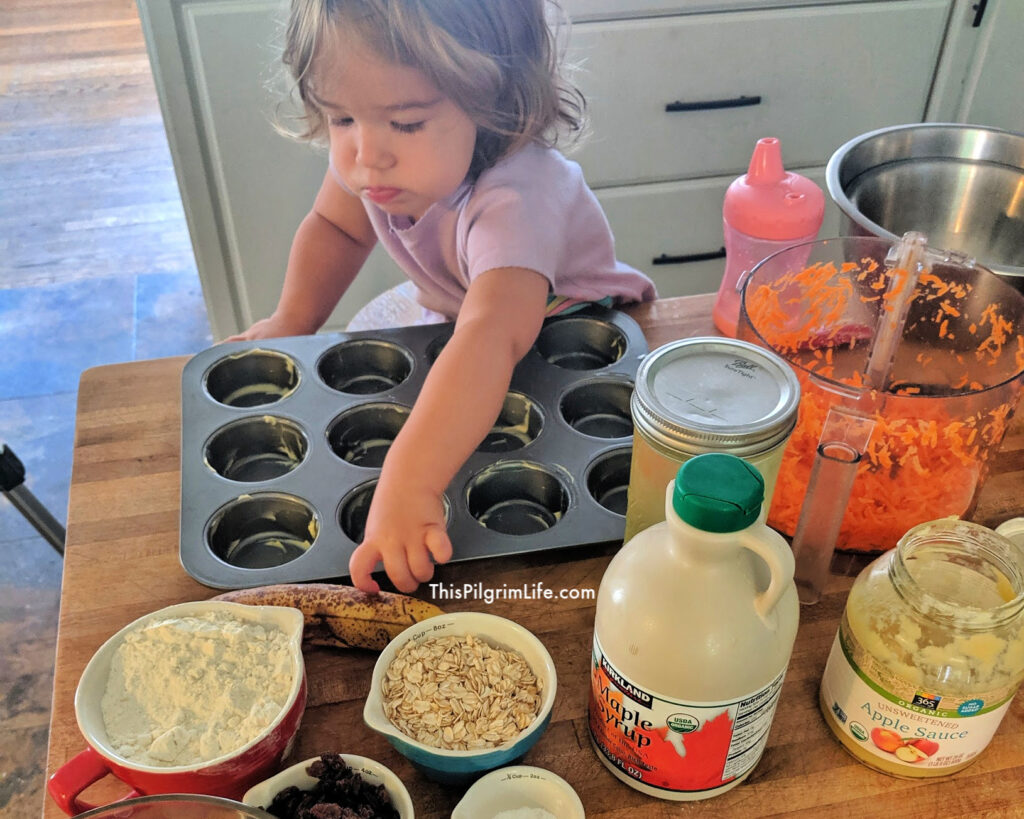
The links below may be affiliate links, meaning I earn a small compensation at no extra cost to you. See my full disclosure policy here.
We have five kids, ages almost ten down to two. Over the years, I’ve logged countless hours in the kitchen, usually with at least one child nearby. It’s not always easy– sometimes it’s far from easy– but recently I’ve made a few observations that reinforce my commitment to letting my kids help in the kitchen.
Currently, we have a three-year-old and a two-year-old who come running (literally running) calling out “I HELP!” every time I so much as stand too long in the kitchen or have a purposeful look on my face. It can be overwhelming to have two eager toddlers want to participate in all the cooking and baking, but having three older children helps to give me some perspective.
Just a handful of years ago, it was my older kids who wanted to be by my side all the time. Now, they’re more than happy to go play and leave the cooking to me. (More on this in a moment). Remembering that the eager excitement to help only lasts for a season can help us to have endurance and also remind us to enjoy their nearness and joy.
Not only are our little helpers learning important skills, they’re also working on a good relationship with food and with ourselves.
My older kids are not completely out of the kitchen now that they have other things to occupy their time, though. My older boys (ages nine and eight) are responsible for making breakfast on weekdays, and my nine-year-old is taking over making dinner once a week. The years of equipping and training alongside me are changing into their own empowerment as they are taking on more responsibility for preparing food and caring for our family.
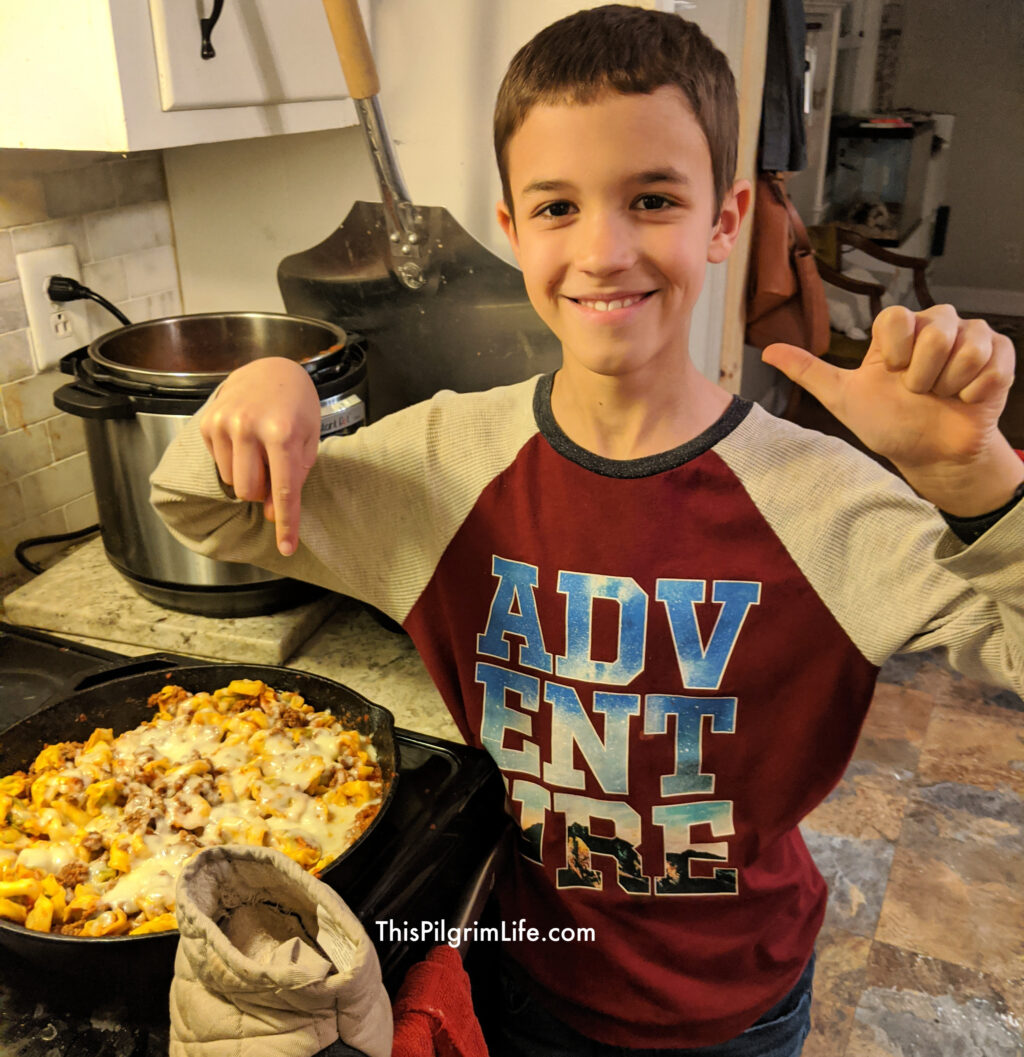
5 Simple Tips for Letting Kids Help in the Kitchen
This is all well and good, but it doesn’t mean that having kids help in the kitchen can’t be overwhelming or time-consuming.
The first thing I want to be clear about is that it does not have to be all or nothing. There is no rule or prize for cooking with your kids for every meal. Figure out what works for your family and your schedule. But also remember that consistency (even just once a week) will help your kids learn expectations and skills more quickly.
It’s also helpful to remember that having kids in the kitchen does get easier in time. They do actually get helpful! Keep at it and you will see the fruit of your labor.
Here are five tips I have learned over the years:
- Take turns. This tip is especially helpful if you have more than a couple of children. You can assign days for each child to help, or simply practice a rotation. However you do it, you will be able to better train your kids when you can help just one or two at a time.
- Ask for help for part of the recipe. There’s no rule that if your kids help you cook, they have to help you with the entire recipe. You can ask them to help you chop veggies, stir a dough, cut biscuits, and then send them on their way. Even just a little participation can be better than none.
- Equip them with useful tools. Kids want to help and be useful! Give them age-appropriate tools and they will be so excited that they can peel and chop too. We love the “dog knives” (sharp enough to cut hard fruits and veggies, but not sharp enough to cut fingers) for toddlers, the kids’ chefs knife (still sharp enough to cut, but with a rounded tip) for preschoolers and younger kids, and then small paring knives for older children who have shown themselves ready to move on to “real” knives.
I also highly recommend our peeler. All of my kids, even my two-year-old, love peeling carrots with it!
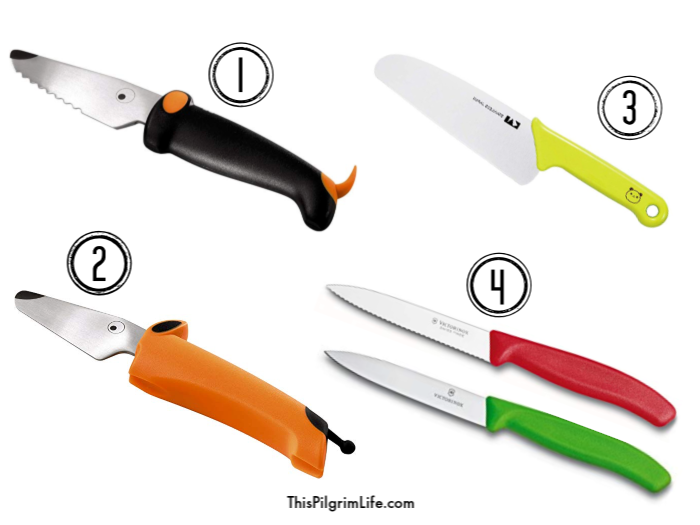
- Make recipes you’re familiar with. Want to make cooking with kids exponentially more difficult? Try to make a new recipe that requires your full attention with your kids in the kitchen. Stick to recipes you’ve made before so you can divide your attention between cooking and coaching.
- Provide alternative activities. Sometimes kids just want to be near you, and it’s not so important that they help you cook. Babies and toddlers can sit in the kitchen with measuring cups, wooden spoons, and bowls. Our toddlers also really enjoy playing with a handful of flour and a dough scraper. Or, even better, a simple dough made by stirring together a little flour and water. It’s a win-win. They get to be in the kitchen, and you get to make dinner by yourself.
- Keep your expectations high. Here’s a bonus tip for you, but one that can make a big difference! Make sure your children know from the start what you expect from them– to listen and follow directions, wait and be patient, stay away from the stove, etc. Not following directions means not being able to help. But I don’t only mean expectations of behavior– keep your expectations of what your kids are capable of high!
Just last week my 6yo and 2yo peeled and cut all the carrots, cubed the potatoes, and sliced the kielbasa for our soup. They poured in the stock and added the spices. After the soup was cooking, they even made cornbread. Of course, this was all with my help and guidance. I stood nearby and gave them instructions one step at a time. I cut the carrots for my 2yo so the carrots had a flat bottom so it would be easier for her to cut.
I was so happy and impressed with how much they did! And they were happy and proud too!
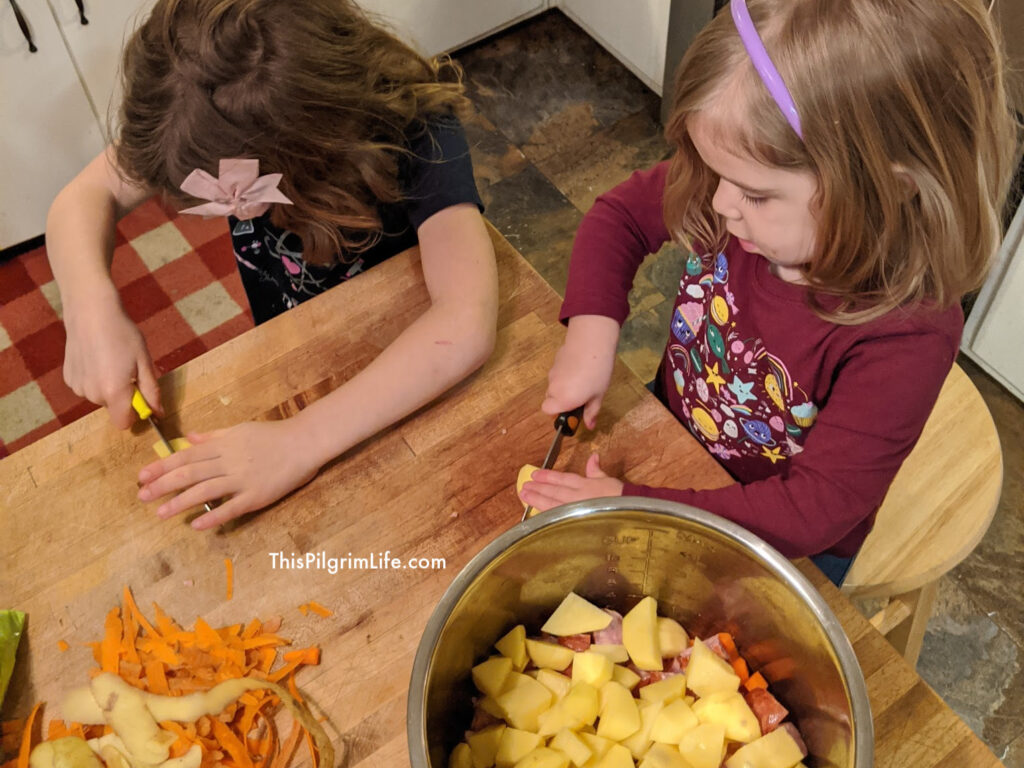
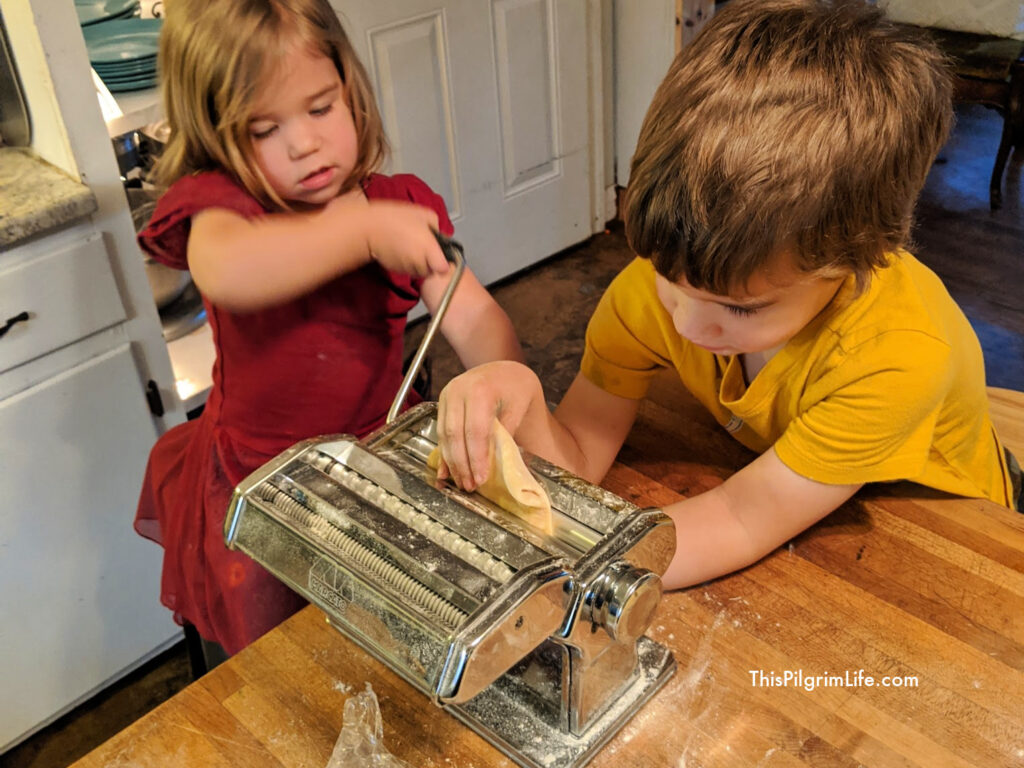
10 Kitchen skills kids can (and should!) learn from an early age:
If you want to start letting your kids help in the kitchen more often, but don’t know where to start, here are some ideas for skills to begin teaching them.
- Stir a dough.
- Pour wet and dry ingredients into a bowl.
- Cut out cookies and biscuits.
- Peel vegetables.
- Chop with a knife.
- Crack eggs.
- Make scrambled eggs.
- Use a cheese grater.
- Flip pancakes.
- Use a colander to rinse fruits and veg.
- Learn how to measure accurately and read a recipe.
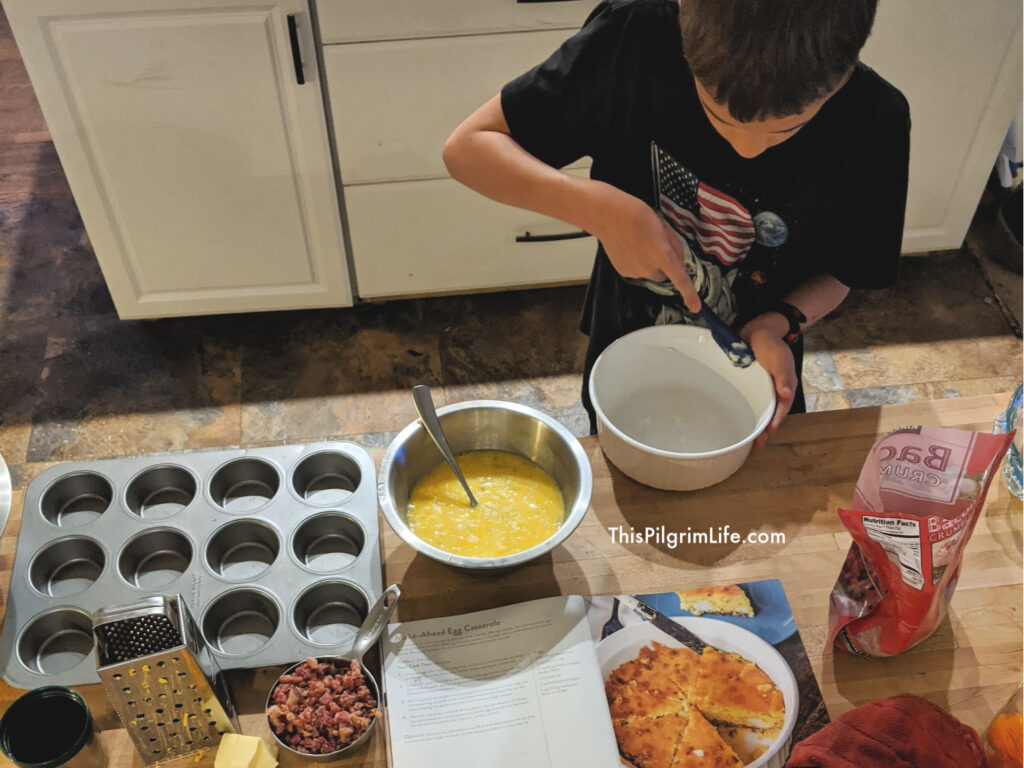
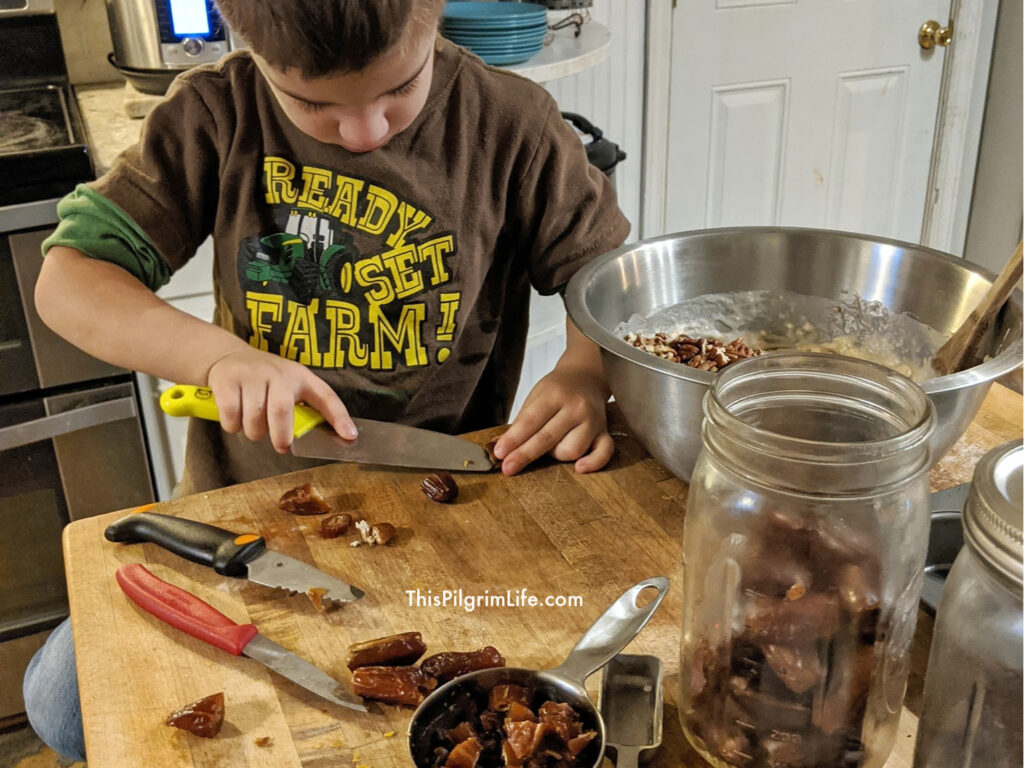
The last skill is another bonus tip– it builds on all the other skills. My oldest is starting to prepare more meals and do more in the kitchen (and outside in his fire pit). I plan to make him a small booklet of recipes to master and I will be sure to share it here too, of course!
Do your kids help you in the kitchen? Do you have any other tips to share? Please add them to the comments!
Sharing is caring! Don’t forget to pin and share. Thank you!
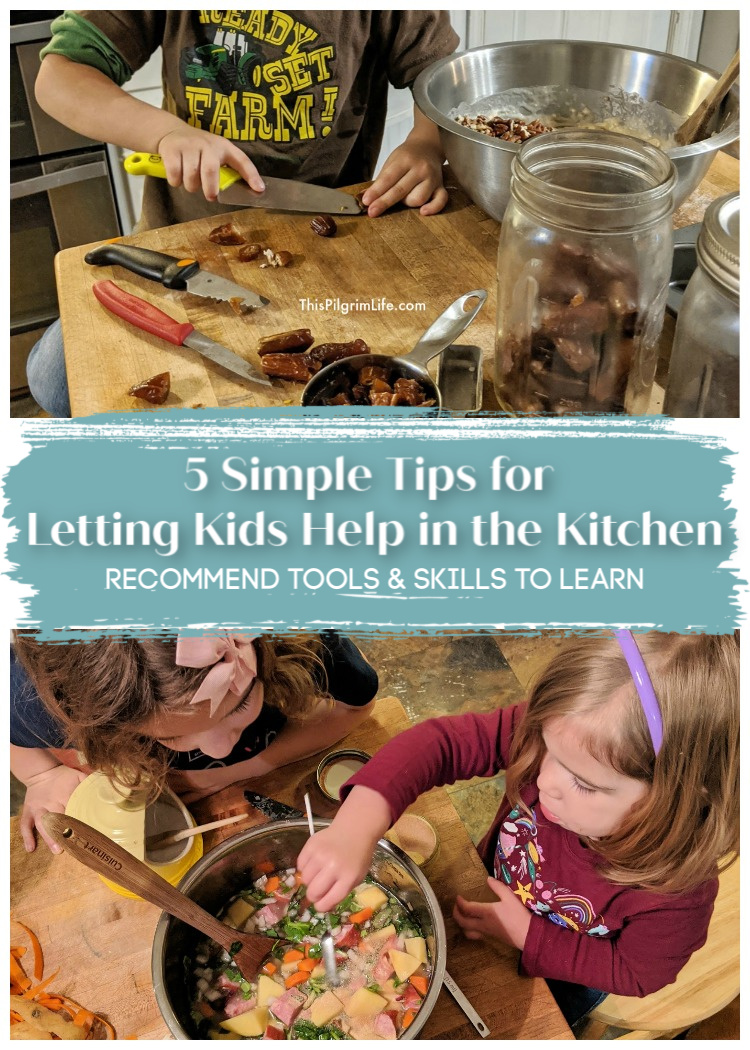
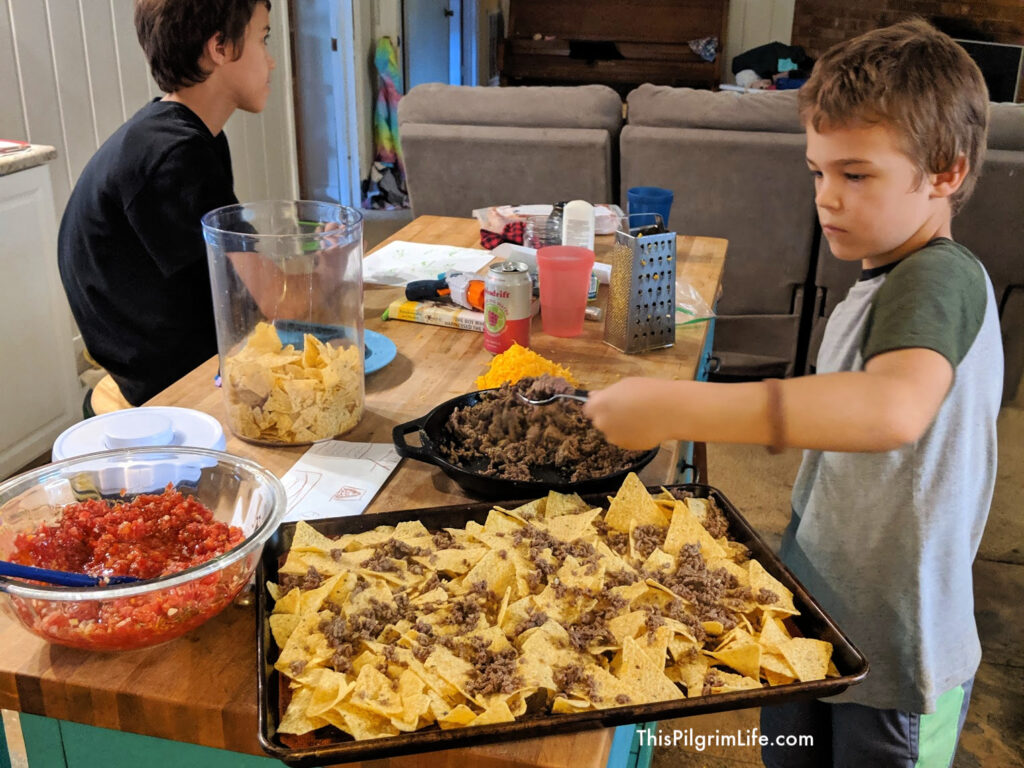
This is such a good reminder! My kids do help in the kitchen, but I also fall into the wanting to be left alone thing too… Or not wanting to deal with sibling arguments while I’m making dinner.
I love that one of your tips is to keep expectations high. I have been thinking on expectations since I saw a poster recently that had two columns: “more” and “less”. One of the words under the “less column was “expectation” and I thought that was perhaps misplaced. I definitely don’t want to get lost in self-placed expectation, but faith is powerful. Hope is powerful. You are so right– our kids really are so capable, even if they don’t do things exactly how we would.